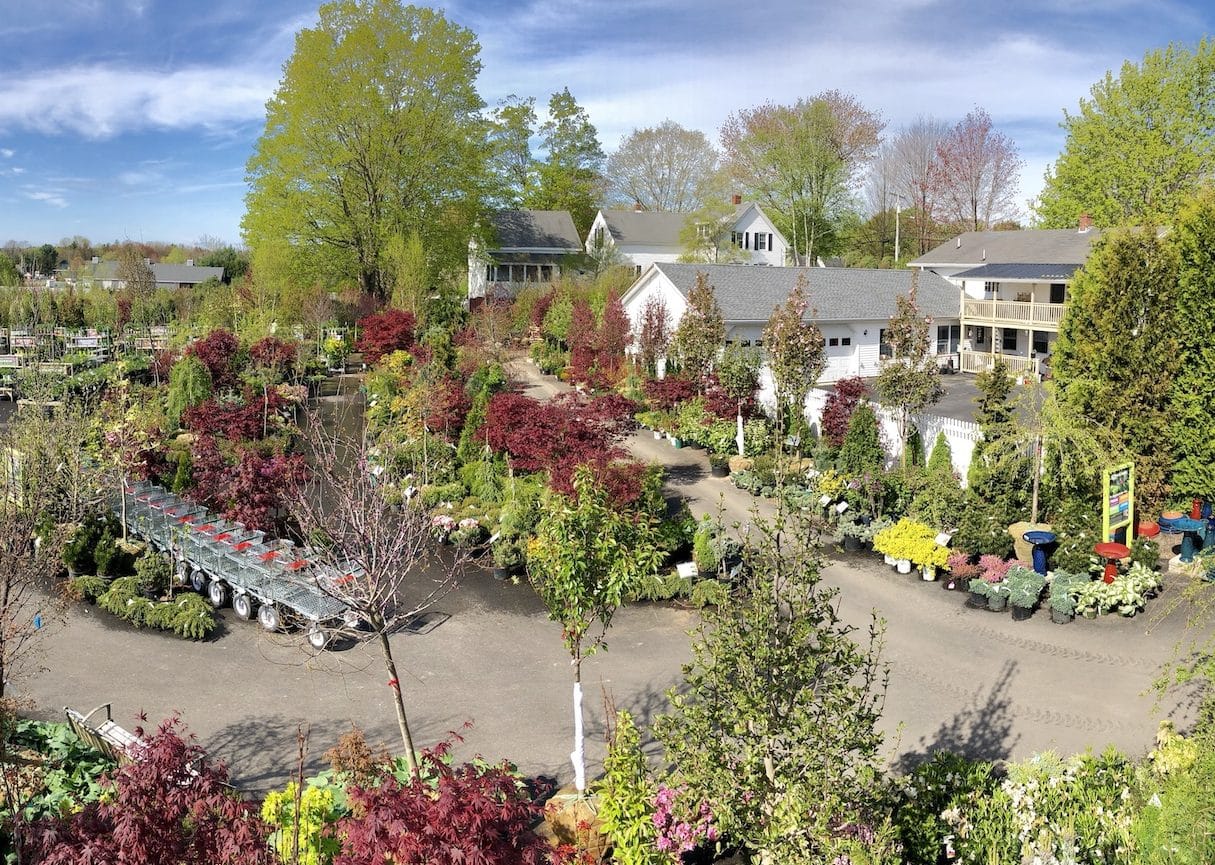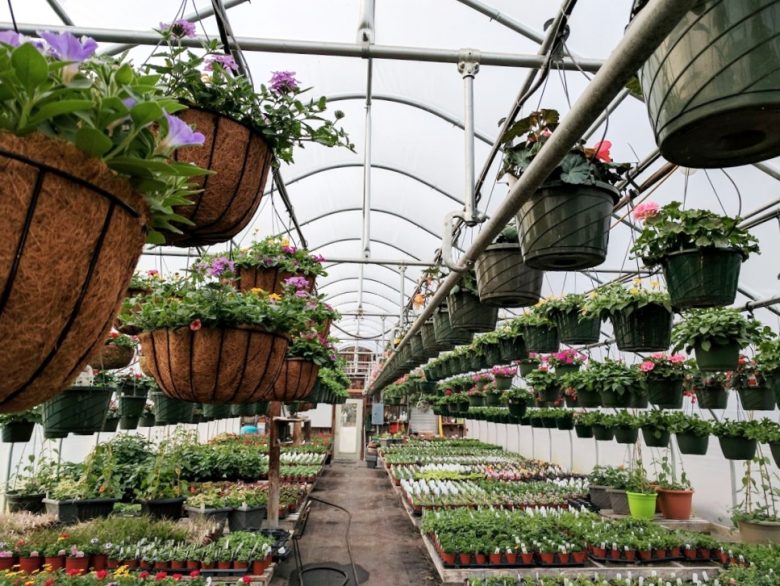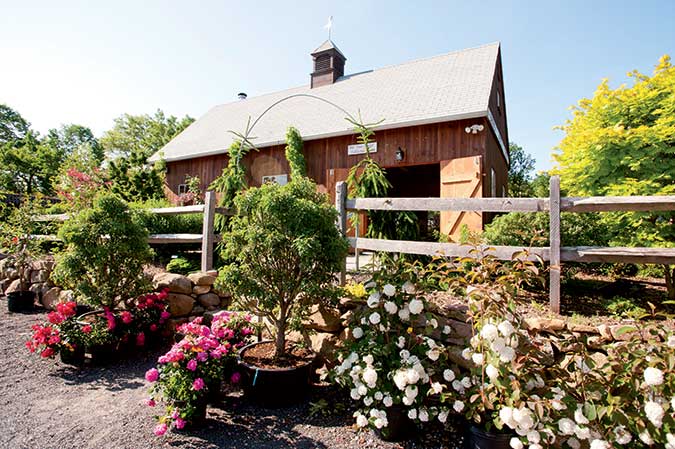Best New England Nurseries & Garden Centers
This roundup of the best New England nurseries and garden centers will help make your gardening dreams a blooming reality.

Gardening inspiration can be found everywhere you look at Estabrook’s in Yarmouth, ME.
Photo Credit : Courtesy of Estabrook’sBest New England Nurseries, Farms & Garden Centers

Photo Credit : Courtesy of Julie Rubaud/Red Wagon Plants
Vermont Nurseries & Garden Centers
Marijke’s Perennial Gardens Plus | Starksboro, VT
Imagination and humor run wild at this retail nursery created byDutch native Marijke Niles at her Green Mountain home. Explore the possibilities in some 40 display gardens on her eight-acre property, where low-maintenance and “nature-nourishing” native plants and hardy succulents are specialties.Olallie Daylily Gardens | South Newfane, VT
Daylily fans, look no further: This three-generation farm grows over 2,500 cultivars, filling its six acres of growing fields with all colors, sizes, and varieties. Peak bloom is mid-July through August; plus, there’s a collection of rare fall bloomers.Red Wagon Plants | Hinesburg, VT
Named the SBA’s 2019 Vermont Woman-Owned Business of the Year, Red Wagon was founded by Julie Rubaud in 2005 as a small wholesale operation. Today it’s a beloved gardeners’ resource that’s open to the public and staffed by some 25 knowledgeable employees who help oversee the growing of 500-plus kinds of annuals, 200-plus perennial varieties, fruit trees and bushes, herbs, and so forth.Walker Farm | Dummerston, VT
A family business since before the Revolution, Walker Farm is not only a one-stop shop for humdrum-busting perennials and annuals, but also a cornucopia of produce, including 125 heirloom tomato varieties and a variety of Asian and Hispanic vegetables, plus berry plants, rare dwarf conifers, and flowering shrubs.Horsford Gardens & Nursery | Charlotte, VT
Having worked for Horsford starting when he was a UVM student, Charlie Proutt bought the venerable nursery with his wife, Eileen Schilling, in 1985 on a mission to bring back its “glory days.” Today Vermont’s oldest nursery (founded 1893) covers nearly 50 acres and includes an award-winning landscaping business. It offers more than 2,000 varieties of plants ranging from roses to evergreens to vegetables, 90 percent of which are grown on-site.Maine Nurseries & Garden Centers

Photo Credit : Courtesy of Estabrook’s
Endless Summer Flower Farm | Camden, ME
To see dahlias in all their dazzling variety, visit Karen and Phil Clark’s family farm, where they plant more than 4,000 of these beauties each spring and harvest the tubers each fall to store for spring shipments to customers. In between, pollinators and dahlia devotees alike take joyful refuge amid the 150-plus creamy-to-jewel-toned varieties available for cutting.Estabrook’s | Yarmouth & Kennebunk, ME
At its main location in Yarmouth (there’s a seasonal shop in Kennebunk, too), Estabrook’s stocks a deep selection of trees and shrubs, including Japanese maples and more than 150 varieties of specialty dwarf conifers. There are perennials and annuals aplenty, a retail center, and a display garden. Even better, after you choose the plants that your dream landscape requires, this third-generation garden center can help greenify your thumb with its extensive online library of how-to videos and articles — Estabrook’s even has its own app!Longfellow’s Greenhouses | Manchester, ME
The second generation of the Longfellow family today oversees what has become one of the largest greenhouse businesses in the state. Love roses? They have more than 100 kinds. Need water garden plants? Sure thing. Want a flowering hanging basket? They produce about 15,000 in their 21 greenhouses, which also nurture thousands of other plants spanning countless varieties (there are 800-plus varieties of perennials alone).Snug Harbor Farm | Kennebunk, ME
Dubbed “one of the most magical places in Maine” by a Yankee editor who stopped by a few years ago, Snug Harbor is a beautifully put-together nursery/garden center/farm stand/menagerie (miniature horses are only the beginning). Topiaries are a specialty, filling two of the five greenhouses; among the array of plants, trees, and shrubs are examples of the elegant art of espalier. If you love the overall style of what you see, Snug Harbor Farm also offers landscaping design and floral arrangements.
Photo Credit : Courtesy of StoneFalls Gardens
New Hampshire Nurseries & Garden Centers
StoneFalls Gardens | Henniker, NH
Set on 10 acres with four greenhouses on-site, StoneFalls is made for meandering. More than 50,000 plants are on offer here, while the display gardens offer plenty of design inspiration. Come midsummer, the sprawling showcase of black-eyed Susans is worth a visit in itself. If your soil needs some zing, dig into the house-made compost; for fun garden accoutrements, check out the gift shop. StoneFalls also offers a landscape design service.Black Forest Nursery | Boscawen, NH
The roots of this fabled nursery began in the mid-1970s, when Bob and Nancy Towle were growing rhododendrons on a one-acre plot and selling them out of a flatbed truck. Today, daughter Suzanne oversees the much-expanded operation, which features an expansive lineup of perennials, annuals, fruit trees, and shrubs. The color show extends to the shop’s wildly fun display of yard art. Mini hot air balloons, bike spinners, and other custom decor, as well as a robust selection of stone accent pieces (birdbaths and animal statuary), round out the shopping experience. Stumped on how to take your yard to the next level? Ask about Black Forest’s garden installation services.House by the Side of the Road | Wilton, NH
This welcoming nursery has been a southern New Hampshire mainstay since 1971. It offers a deep selection of water garden plants, annuals, and cacti, as well as a lineup of homegrown perennials that numbers well into the hundreds. Pear, apple, and plum saplings are just a taste of the trees and shrubs found here. And bring the family: There are indoor and outdoor ponds with turtles, koi, and goldfish for the kiddos to ogle, plus free hot coffee for parents.Rhode Island Nurseries & Garden Centers

Photo Credit : Kindra Clineff
Issima | Little Compton, RI
Dubbed “the smallest nursery in the smallest state,” Issima has an appeal that belies its size. Founded by veteran plant experts Ed Bowen and Taylor Johnston (a one-time horticulturist at the Isabella Stewart Gardner Museum), this intimate coastal nursery is a treasure trove of rare and uncommon plants, including under-the-radar hydrangea and delphinium varieties.The Farmer’s Daughter | South Kingston, RI
Sarah Partyka always knew she’d be in the family business. Her grandparents farmed a plot of land in South County, and her parents later opened one of the state’s first pick-your-own strawberry operations. In 1998, Partyka, who has a graduate degree in agriculture from the University of Rhode Island, opened the Farmer’s Daughter on the same patch of land where her folks’ PYO operation once stood. In the years that followed, it’s come to offer one of Rhode Island’s most diverse collection of perennials, including many historical varieties, as well as a healthy collection of trees and shrubs. All this greenery and color doubles to make the nursery a popular wedding venue.Wicked Tulips | Exeter, RI
When spring comes, more than half a million tulips erupt in layer-cake rows of saturated color at New England’s largest u-pick tulip farm. Wicked Tulips had to make some creative pivots in 2020 but, thanks to the support of fans and friends, plans to return in 2021 to keep sharing the tulip love.Connecticut Nurseries & Garden Centers

Photo Credit : Kindra Clineff
Broken Arrow Nursery | Hamden, CT
This destination nursery is known for its knack with unusual and hard-to-find plants, most of which are propagated on-site. The Connecticut state flower, mountain laurel, is a specialty, although the offerings have expanded to include more than 1,500 types of perennials, shrubs, trees, and conifers, many of them natives.Ballek’s Garden Center | East Haddam, CT
The farm at the heart of Ballek’s Garden Center has been in the family since the 1660s, and this solar-powered, green-thinking business prides itself on old-fashioned values and service. From trees and shrubs to houseplants and orchids — and pretty much everything in between — Ballek’s is a great one-stop shop, whether you are doing some routine spring freshening or planning an offbeat accent garden.Cricket Hill Garden | Thomaston, CT
Cricket Hill was founded in 1989 as one of the first U.S. nurseries to sell true-to-name varieties of Chinese tree peonies. Today these rare gems fill a six-acre display garden dubbed “Peony Heaven” that is a springtime must-visit. Perennial peonies also share the spotlight, along with hardy fruit trees and ornamental trees and shrubs.Earth Tones Native Plants | Woodbury, CT Native | Fairfield, CT
Both Earth Tones and Native are smaller nurseries focused on species of perennials, shrubs and trees that are native to New England. If environmental preservation and tradition are important to you, populating your gardens with indigenous species is an ecologically friendly, habitat-sustaining option, and the selections at these two nurseries are broad enough to allow for eye-catching surprises.Logee’s | Danielson, CT
Wandering the six greenhouses and retail shop at this family-owned exotic-plant specialist is a bona fide treasure hunt. Marvel at such rarities as an orange tree bearing 10 varieties of fruit, a ‘Ponderosa’ lemon tree that’s been growing since 1900, and a spectacular jade vine, then load up on the makings of your own tropical escape.O’Brien Nursery | Granby, CT
The humble hosta is anything but at founder John O’Brien’s namesake nursery, which packs more than 1,600 hosta varieties into its ample display gardens. Japanese maples more your thing? Find more than 100 kinds here, from ‘Emerald Lace’ to ‘White Peaches’ to ‘Crimson Queen,’ plus shade perennials, daylilies, conifers, and more.White Flower Farm | Morris, CT
The 20-foot-wide, 280-foot-long perennial border is itself a reason to visit, but there’s lots more to see at this glorious garden center founded in 1950. A self-guided walking tour leads through 10 landscaped acres, while the greenhouse and the farm store invite shopping for bulbs, plants, trees, and an array of garden gear and gifts.Massachusetts Nurseries & Garden Centers

Photo Credit : Courtesy of Chuck Doughty
Campo di’Fiori | Sheffield, MA
Container aficionados will discover new ideas at every turn at this chic garden center, whose signature handmade, moss-covered pots stand out amid the array of accessories and plants. Lush gardens sprinkled with statuary invite lingering.
Cochato Nursery | Holbrook, MA
The elegant display gardens are enough of a reason to visit—come for a scenic walk and stay for some great shopping. Owners Sue DuBrava and Chuck Doughty (who also directs landscaping for Northeastern University) bring a curator’s eye to their collections of hostas, perennials, shrubs and trees, and wildflowers.Nasami Farm Native Plant Nursery | Framingham, MA
There are so many reasons to garden with native plants. They’re adapted to the New England climate, resistant to pests, and friendly to pollinators. This nursery, run by the Native Plant Trust (formerly known as the New England Wild Flower Society, sells plants that are either sustainably collected from seed or propagated on-site. And staff members are endlessly helpful.Bay State Perennial Farm | Whately, MA
Bay State hits a particular sweet spot among nurseries: small enough to offer excellent customer service but large enough to maintain a diverse collection of proven and rare cultivars. Owner Peter Flynn offers a rainbow of spring hellebores and a riot of summer hydrangeas, attracting customers from all over New England. Where are your favorite New England nurseries and garden centers? This post was first published in 2014 and has been updated. An abridged version also appeared in the March/April 2021 issue.SEE MORE:
Best New England Public Gardens & Parks From the Coastal Maine Botanical Gardens to the roses at Elizabeth Park in Connecticut, here are eight of the best public gardens in New England.
Best New England Arboretums & Botanical GardensThese eight New England arboretums and botanical gardens offer the perfect nature escape.Best New England Garden AttractionsFrom a bridge of flowers to the oldest topiary garden in the country, these eight New England garden attractions offer natural beauty in a curated setting.


